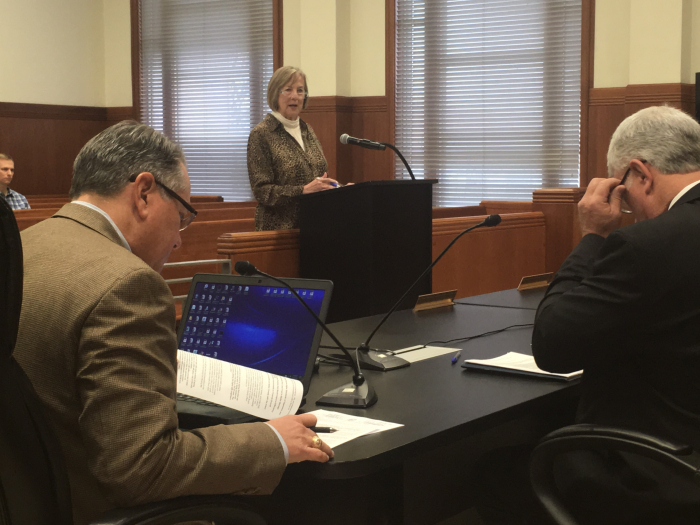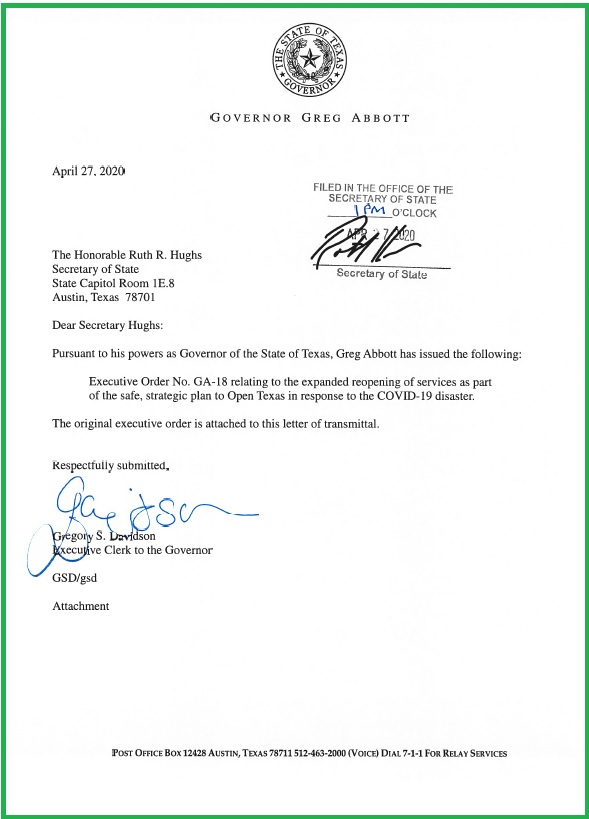Water watchdogs holds LCRA to state oversight

Connie Swinney/The Highlander
Jo Karr Tedder of the Central Texas Water Coalition presented an update March 12 to Burnet County Commissioners with a focus on the Sunset Review process which monitors and provides oversight for state agencies and river authorities.
By Connie Swinney
Staff Writer
A watchdog group announced a victory in oversight of the Lower Colorado River Authority which can result in improvement recommendations or event potential abolition of water authorities, if they entity demonstrates either wasteful spending or propagates duplicate or unnecessary programs.
Jo Karr Tedder of the Central Texas Water Coalition made a presentation to Burnet County Commissioners March 12 about the latest battle between her non-profit entity and the Lower Colorado River Authority.
She explained that in 2017 LCRA attempted unsuccessfully to exempt itself from scrutiny from the recently-established Texas Sunset Advisory Commission.
“This is the first time the river authorities have been through the Sunset Review,” she said. “It will happen from now on.”
The Sunset Commission, created by state lawmakers in 2015, is tasked with researching and analyzing the need for possible improvements to how state or water authorities as well as state entities operate.
Sunset Review can offer recommendations to the state legislature on where state agencies and water authorities can eliminate wasteful or duplicate programs or potentially determine if the entity should be abolished to cut excess government spending.
Bills which come from the commission go through the regular legislative process.
“In 2017, LCRA wanted to be carved out because they were 'different' because they wer also water and electricity and transmission,” Karr Tedder said. “LCRA spent $450,000 on lobbyist. We spent $50,000 on our two lobbyist, and LCRA lost.”
Following the legal legislative fight, LCRA officials embraced the outcome and soon after cooperated fully in a review.
“LCRA was pleased to participate in the Sunset Commission review of our organization,” Bill Lauderback, LCRA executive vice president for Public Affairs, said in a statement. “We agreed with the Sunset Commission’s recommendations and are looking forward to working with the Legislature to make sure the recommendations are incorporated into statute.”
Karr Tedder said a few concessions quelled the victor over LCRA.
“We were disappointed in a lot of things. What Sunset did a really good job with is transparency and openness. We really supported that,” she said. “There were some things outside the scope of review.”
She explained the LCRA was not bound to reveal its “rate setting process” with regard to how rice farmers are billed for water released from the Highland Lakes to the coast.
Also, the entity did not share why it utilizes perceived “outdated” methods for determining water needs, Karr Tedder said.
With population and industry growth, “things have changed drastically,” she said.
Along with the Sunset Review process, Karr Tedder offered more insight into the organization's activities:
• CTWC recommended changes to the LCRA's Water Management Plan which mandates rice farmers first be offered so-called “run of river” water as a priority for use in lieu of immediate water releases from the Highland Lakes. Run of river is water that does not stay in the reservoirs for 24 hours.
“Rice farmers were happy, however, it (did) restricted the amount that can come out of Lake Travis,” she said.
Burnet County Pct. 4 Commissioner Joe Don Dockery said while the fight to minimize reservoir flow releases may be won, future agricultural water needs could arise.
“If they take from 'run of river,' that falsely creates lower environmental flows from the coast,” Dockery said. “They will call for releases from the lake to supplement those.”
Karr Tedder added that she welcomed more data and transparency in how water authorities determine agriculture or environmental needs.
“LCRA decides how much water stays in and how much goes down (river),” she said. “We've never been able to get a clear picture of the methodology they use to do that.
“That's been one of our points,” she added. “That's why I like the Sunset Review for the transparency. They hit them really hard on making the data available.”
• CTWC is keeping close watch on a pending Texas Water Development Board (TWDB) study on watersheds.
“It's a big issue. As population has increased, and little ranches have come in up basin from us,” Karr Tedder said. “Everyone wants a stock pond, but if you put in several hundred stock ponds and you have 104 'alluvial wells' along the San Saba River which are sucking that river dry, it's a real issue.”
In the past five years more than 100 “alluvial wells” were created which are less than 40 to 50 deep, she explained. Alluvial wells pull out of or pull from the under flow of the river.
The typical groundwater well is 200 ft. deep.
“It opens a can of worms,” she said.
• CTWC has launched a battle against proposed 2017 legislation which would eliminate the contested case hearing. Contested case hearings are a legal process overseen by administrative judges, which are tasked with ruling on disputed issues among parties on issues such as air quality permits or water use contracts.
“Everybody was shocked because that's one of the rights you have,” Karr Tedder said. “The contested case hearings are the only things that protect us . . . if they do something that would be detrimental to our water supply.”
Other areas in which CTWC is participating include an economic impact review of waterways and the creation of a group formed to address concerns about the 2018 flood; and monitoring, consultation and participation in activities associated with TWDB, the Region K Water Planning Group and the Texas Commission on Environmental Quality as well as LCRA.
Burnet County Judge James Oakley recommended CTWC officials reach out to Llano County officials on flooding and mutual waterway topics as well.
“Burnet and Llano county work together on a lot of issues. There's only a river between us, and in this case the issue is the river,” Oakley said. “A lot of this might be about understanding what went on. A lot of people form opinions based on wrong information.
“We just need to make sure there is good information out there and form those opinions and have a working group,” he added.
Karr Tedder concurred and thanked the commissioners.
“You were the first group to be supportive of us protecting the water,” she said.
Find this story and more news coverage from Burnet, Blanco and Llano counties in The Highlander, the newspaper of record for the Highland Lakes. To offer a comment or news tip, send a note to lew@highlandernews.com.






